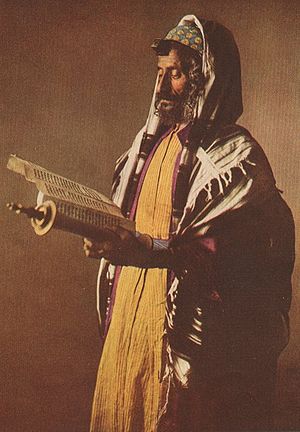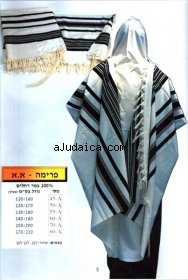Re: Questions about Judaism awnsered by a Jew!
Question: What does it mean to be a cultural Jew? (Not implying that you are as you have said on occasions that you are an Orthodox Jew.)
To understand this, you must understand what a "Jewish Community" really is.
Unlike other religions Jews usually stay very close to eachother in tight nit communities. Because of the diatary laws, ect, Jews have a hard time survivng outside of "Jewish Areas"... It is possible, but it is very easy to be a Jew in a Jewish area, so some of the Jews who really do not practice the religion that much still live in these areas, and there culture is centered around Judaism even though they do not in a sense practice much of the religion.
I thought that the way to enter Israel again for jews is to Obey G-d and repent as mentioned in the Torah, But from what I understand you are saying no on G-ds obedience but random chance of random jews being persecuted by Gentiles. What happens to the ones that don't get persecuted, do they wait to get persecuted before entering or are they regarded as gentiles?
You don't wait, to get persecuted. Jews were thriving in Poland, and the only reason they would ever leave is because of persecution anyway. It is a very difficult subject. But to have an overall understanding of the verse you must know Talmud, and know the fact that much of Talmud is conversations of Rabbi's and conflicting opinions.
PM me if you want me to go in depth if you are very interested in more.
from what I understand, the 3rd law in Talmud refers to persecuted Jews, does that mean the ones that are not persecuted have no right to be a part of israel?
No, the Jewish people in general were persecuted. But either way it is irrelevant because the state of Israel is not actually run by Jewish law or the Sandrehin courts.
Again, PM me if you want me to go in depth if you are very interested.
WHat are the requirements by G-d to be a prophet? How did Moses(AS) meet these requirements while Jesus(AS) and Mohammad (PBUH) Didn't?
When HaShem sends a prophet, He gives the prophet a sign to show that he is a true prophet. However, not every person who shows such a sign is automatically accepted. The prophet must be known to be a great, wise, and righteous person. If he is such a person, then we are commanded to accept and obey him if he comes with a sign.
Even if a prophet passes all of these tests if he attempts to contradict the Torah in any way he is automatically shown to be false. This requirement can disqualify any prophet at any time. A prophet may not add or detract from the Torah in any way, this applies to both the Written Torah and the Oral Torah. Therefore, any prophet who claims that a certain mitzvah is no longer required or that a new mitzvah has been added to the Torah shows himself to be a false prophet and is judged accordingly. This is true even if he performs miracles.
Judaism also (based on Deuteronomy Ch. 13 and 18:20) holds that no true prophet will create a new faith or religion as a successor to Judaism.
what does your Talmud say regarding tolerating other religions and races (Gentiles)?
Maimonides, Mishneh Torah, Hilchot Teshuvah 3:4 based on Tosefta Sanhedrin 13:1; Talmud Sanhedrin 105a
Righteous gentiles have a place in the world to come
Jerusalem Talmud Peah 1:1
It says: (J37-23)
"With justice and an abundance of kindness, He does not deal harshly." G-d does not withhold reward from gentiles who perform His commandments.
the very small thing that you put on top of your head when you are reading Torah.. what is it and what is the purpose of it?
You do not just put it on to read Torah. It is put on every morning during prayers except on Saturday's, and Holy Days.
It is called:
Teffilin
Tefillin (Hebrew: תפלין), also called phylacteries, are either of two boxes containing Biblical verses and black, leather straps attached to them which are used in rabbinic Jewish prayer. They are an essential part of morning prayer services, and are worn on a daily basis (except the Sabbath and festivals) by many Jews. Tefillin and phylacteries are plural the singulars are tefilla and phylactery. In this article the term “to lay tefillin” will be used throughout but it is still correct to use “wear”.
Tefillin stems from interpretations of passages found in the Torah (five books of Moses), in Deuteronomy 6:8, 11:18; Exodus 13:9, 16. While these passages were interpreted literally by most commentators (in contrast to the interpretation of Karaite Judaism, Abraham ibn Ezra, and Rashbam on Exodus 13:9), the Rabbis held that the general law only was expressed in the Bible, the application and elaboration of it being entirely matters of the oral law. The earlier tannaim (rabbis of the Mishnah) described their views of the tefillin in the Mishnah and Talmud. (Talmud references: Menachot 34b; Zeb. 37b; Sanhedrin 4b; Rashi and Tosafot ad loc. )
A Yemenite Jew with head tefilin on.
and also when you are done praying, is it a must for you to wear white shirt that has threads coming out of it?! and what is the purpose of it..?
You can mean two things: Tallit
Katan, or Tallit
Gadol.
Tallit Katan
The tallit katan (traditionally known as tallét ketannah amongst Sephardim), or "small" tallit, is worn for the duration of the day by Orthodox Jewish men. While it should not be worn directly on the skin, it is often worn beneath one's shirt (yet above an undershirt) so as to conform to societal dress codes. However, Chassidim tend to wear them on top of their shirts, as they do not desire to conform to the modern Western-style mode of dress. They do, however, wear a suit vest over their tallit katan.
A religious Jewish man ties the tzitzis (corner fringes), being careful to follow the correct sequence of knots, according the tradition of the buyer.
Tallit Gadol
The tallit gadol (traditionally known as tallét gedolah amongst Sephardim), or "large" tallit, is worn over ones clothing resting on the shoulders. This is the prayer shawl that is worn during the morning services in synagogue and by the leader of the prayers during some other services.
Tallit Gadol worn at the Kotel (Western Wall) during Morning Prayers.
Tallit Gadol worn by a Jewish Man.
The Torah states in Numbers 15:38:
"Speak to the children of Israel and you shall say to them that they shall make for themselves fringes on the corners of their garments, throughout their generations, and they shall affix a thread of blue (Hebrew: תכלת - tekhelet) on the fringe of each corner."
Tzitzit are also commanded in Deuteronomy 22:12, which says: "
You shall make yourself twisted threads, on the four corners of your garment with which you cover yourself."
What is said about respecting other religions and tolleration....Can we please have a quote from the torah Thnk u....
Not positive if it says anything, because when we were given the Torah by G-d, it was Judaism, and then the rest of the world were all pagans who were killing eachother in massive wars.
The Torah stresses to love your neighbor as yourself, and to treat strangers warmly, as long as they are not your enemies.
My question is not to offend. But do you follow Jewdaism on blind faith, or have you done enough research to know that this is the true religion based on facts and science and all types of knowledge?
No. I have studied many religions, and I believe Judaism to be the true message. Judaism has always been the true messae.
Judaism began when over 600,000 male adults alone heard the first two Commandments from G-d and passed that legacy on to their children. Unlike many religions that started with people claiming to be prophets.
Damn that was a long post... lol. 




